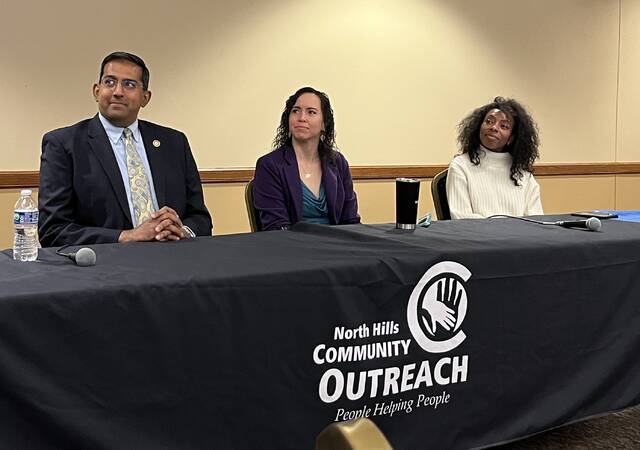https://triblive.com/local/north-hills/north-hills-community-outreachs-breakfast-for-local-leaders-emphasizes-need-for-collaboration/
North Hills Community Outreach’s breakfast for local leaders emphasizes need for collaboration

Amid the state budget impasse and federal funding cuts, three state representatives at the North Hills Community Outreach Community Leaders Breakfast said collaboration among nonprofits, businesses and government is more important than ever.
State Reps. Arvind Venkat, D-McCandless; Emily Kinkead, D-Brighton Heights; and Lindsay Powell, D-Lawrenceville, spoke on a panel to leaders of local nonprofits and businesses Oct. 16 at the Millvale Community Center to discuss how the three sectors can collaborate to address needs such as housing, transportation, mental health care and child care.
Though the annual breakfast is not a new event, NHCO Executive Director Scott Shaffer said this was the first time the breakfast hosted a panel of state representatives.
“As part of our updated strategic plan, what we’re doing is working on advocacy efforts, which is somewhat new for NHCO — to not only look at the ways that we can solve problems directly, but also advocate for broader solutions that are affecting our clients,” Shaffer said.
The lawmakers urged attendees to build ongoing relationships with their representatives by regularly communicating community needs and inviting them to visit their organizations.
“Your ideas are better than our ideas. We do not come up with solutions that turn into legislation. The ideas come from you,” Venkat said. “Please make connections with your state and local elected officials. That is where 90% of the governing is happening.”
Kinkead added that because representatives are “pulled in a bunch of different directions,” one meeting with one person isn’t enough “to keep the issue fresh in their minds.”
“Don’t go and talk to people for the first time about something that you want in the budget in June. Talk to them in January, and keep talking to them throughout the process,” Kinkead said.
Powell agreed and added that representatives “love a good field trip.”
“Please invite us out to your organizations. I always tell folks, ‘Galas are fun, but we really want to be able to see what you do on the every day,’ ” Powell said.
After roundtable discussions amongst themselves, attendees wrote on index cards about what they think the most pressing community needs are right now. NHCO staff then collected the cards and shared the results with the panel so they could speak to those issues.
Housing instability, transportation access
Powell said population decline across the region has resulted in a “strange housing market” with an abundance of blight, vacancy and abandoned properties with accrued taxes, but few tools to revitalize such as a “viable land bank or land recycling programs.”
“Other states also have programs to get rid of those taxes on those delinquent parcels, to put them back into usefulness. We just don’t have these things, partially because we don’t have the structure for them, partially because they’re not funded,” Powell said.
Powell said the region’s housing crisis includes not just homelessness but also middle-income workers who earn about “$50,000 a year and still cannot find appropriate housing” because “we don’t have enough housing stock.”
Venkat pointed to the public transportation debate as evidence of “a governance gap” in state government and at the federal level.
He said everyone he spoke with about the issue recognized public transportation as “a public good” that should be funded, but some lawmakers still argued, “We can’t afford this,” even though we absolutely can afford this.”
Mental health care and child care
The panelists highlighted better funding for social workers and child care as reform opportunities.
Kinkead said the state should expand Medicaid reimbursement for social workers and community health workers who provide services in the community.
“If you can’t get Medicaid reimbursement for those services, you basically have to go out, convince people to come back to a clinic and then you can get paid, but only for the stuff that happens there,” Kinkead said.
Powell said Pittsburgh’s Office of Community Health and Safety, which she helped to establish, sends social workers with police and other emergency responders to crisis calls through their co-response program, “so that people aren’t getting that mental health treatment in jail or in the ER.”
When discussing child care, Kinkead connected the issue to housing and food instability.
“If you don’t have high-quality child care, then you don’t have the ability to keep a job. If you don’t have a job, you don’t have the ability to pay for housing or food,” she said.
Kinkead said she saw firsthand the struggle many parents face when, during her first year in office, her chief of staff had a baby.
“On a salary that is really good for this region, she couldn’t find child care that was affordable,” Kinkead said. “New Mexico just passed universal child care, which means that everybody gets access to child care. And that’s huge. And that is not just a thing that’s a benefit for mothers, for parents and families, that’s also a major economic driver.”
Venkat said studies show early childhood interventions are “the most cost-effective policy interventions we have” and urged business and nonprofit leaders to press lawmakers to act.
“It is a minority in the Legislature that is stopping (these interventions), and it would make a huge difference on top of the investments that my colleagues spoke about,” Venkat said.
Alena Anderson, director of Moving Toward Financial Stability at United Way, said she is impressed with the breakfast every year and especially appreciated the presence of the lawmakers this year.
“Government is a huge part of the system of support,” Anderson said. “We’ve been really trying to establish relationships with our legislators. So I appreciate that they’re here and visible and willing to talk to people.”
Copyright ©2026— Trib Total Media, LLC (TribLIVE.com)
